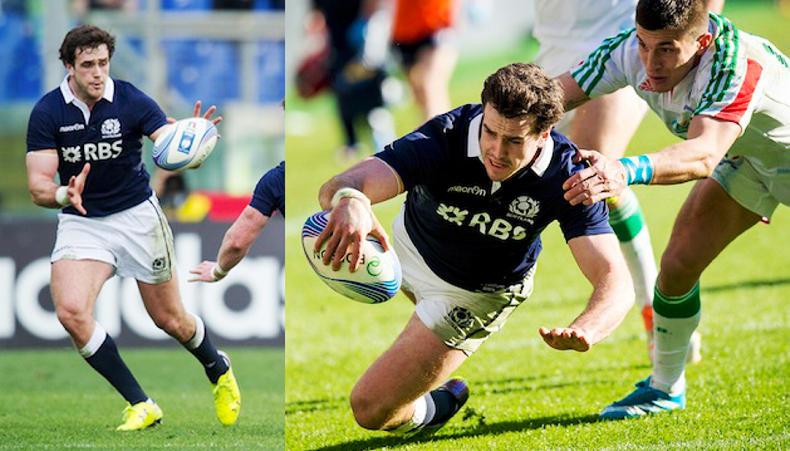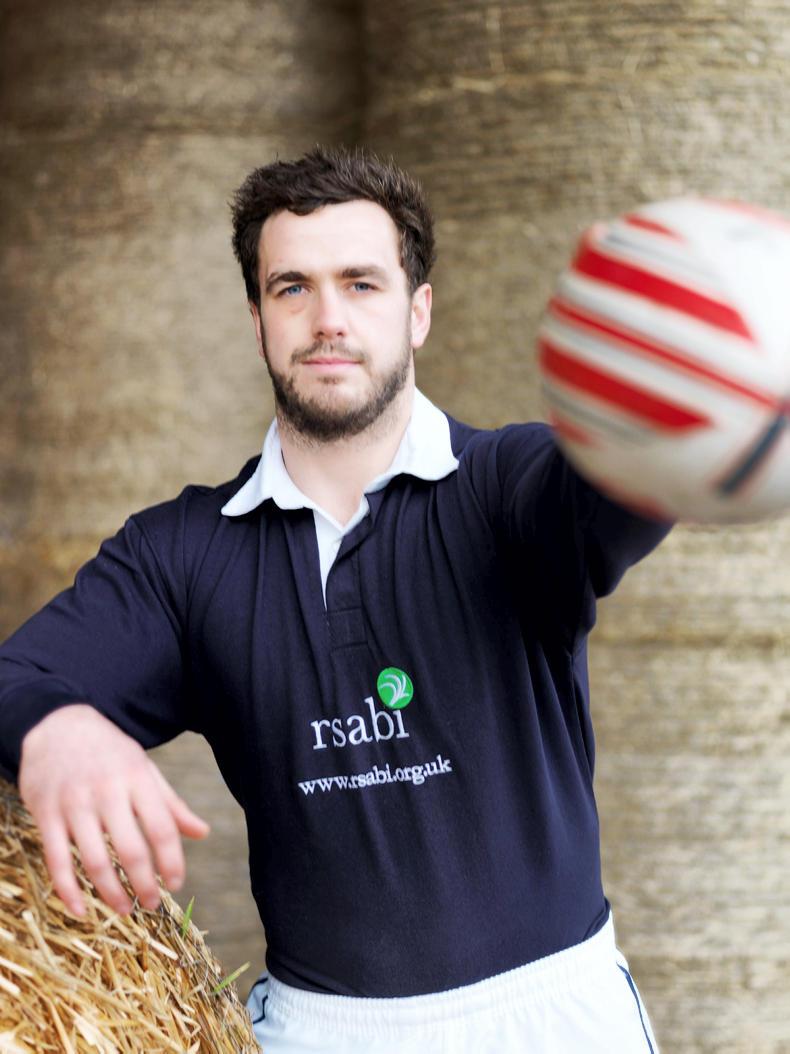Returning from a knee injury, Alex Dunbar was back out on the pitch last Friday night, which saw the Glasgow Warriors obtain an eighth successive Guinness PRO14 victory, this time against Leinster.
The victory was a surprise to many, with the Irish side on a rampaging run this term – both in the Pro14 and in Europe. However, for Dunbar, the victory was a measure of the side’s commitment, as well as the resurgence of Scottish club rugby
“We’ve had a good start in the season, saw some different ideas from New Zealand. The boys are positive at the moment and playing well,” he told Farmers Journal Scotland.
“I had a cleanout of my knee and cartilage removed. It’s a bit frustrating starting a season and getting an injury just a few games in.”
If we can keep everyone fit we have a good chance
Raised on a dairy and sheep farm in Dumfries, Dunbar spent much of his childhood working with sheep, but the lure of the bovine was too much.
“We had a pedigree flock of Texels, as well as a commercial mule flock. I used to love taking the tup to the show, but once I got to 12 the novelty wore off. I’m more of a cattle man really.
“I’m quite keen on dairy, but it’s a very volatile business,” he says. His parents were milking 80 cows in Scotland and had 1,300 sheep. But expansion was constrained by infrastructure and land, so they now farm 400 acres with 380 dairy cows in Tasmania.
“My parents had been on holiday to Australia and it was just the whole package really: the weather and a lot less regulations.
"They used to get frustrated with the amount of paperwork. When farming near a village there are always complaints about something. Over there it is far more relaxed.”
Dunbar has only been out to Tasmania a handful of times, as much as his rugby schedule will allow. But his girlfriend’s father gets Alex in to help with the pigs and hens in the orchard.
Although the pigs were turned into a Sunday roast when it was discovered that they were eating the prized hens.

From a young age, Alex found that there was a big connection between farming and rugby.
“Quite a lot of the boys that played came from a farming background or worked in agriculture. When I moved up to Selkirk it was similar there. But as you get up to the elite international stages there are just a few with farming backgrounds.”
Across the British Isles, there are some heavyweight and farming enthusiasts.
Sean O’Brien, Tadgh Furlong, brothers Rob and Dave Kearney and Rory Best from the Ireland set-up all either farm or grew up on a holding. The 2013 Lion and current Wales flanker Dan Lydiate is a cattle farmer, while in recent years former England frontrowers Phil Vickery and Julian White are from the land.
Becoming an ambassador for the RSABI was a natural fit for Alex, with his connections to farming. In the role for three years now, his job is to encourage people to support and donate to the charity and spread the word about how it helps people.
“It’s quite a small charity, so I try to make people aware of it. In the last couple of weeks I’ve met a couple of beneficiaries. A lot of people say that once they’ve had the first conversation they can see the light at the end of the tunnel. Sometimes people don’t know where to turn.
"There’s a 24-hour helpline if you ever do feel the need to talk to someone.”
South Africa
What does he think of the two South African teams in the PRO14 this year?
“South Africa is a difficult place to go play. The boys played in Bloemfontein and it’s the exact opposite of Scotland; really warm.
"The first few days playing they said they really felt it quite a bit.
"But if South Africa is competitive it’s only going to make the competition better.”
Building on success
The year 2017 was an encouraging Six Nations for Scotland. Three wins over Ireland, Wales and Italy left Scotland joint second, albeit a clear five behind old rivals England.
With the autumn tests coming up this month against Samoa, New Zealand and Australia, the thoughts are already building towards next spring’s 2018 Six Nations and the opening game on 3 February against Wales.
So what are the chances for Scotland?
“If we can keep everyone fit we have a good chance.
"There’s some exciting talent in the squad and very little difference between the top teams. It’s tough at the top, the top three or four are always up there. But matches are quite close. We’re not a million miles away from these teams.”
Alex Dunbar is another example of how when rugby and farming collide, rugby benefits.
Read more
Ireland focusing on the long game
Returning from a knee injury, Alex Dunbar was back out on the pitch last Friday night, which saw the Glasgow Warriors obtain an eighth successive Guinness PRO14 victory, this time against Leinster.
The victory was a surprise to many, with the Irish side on a rampaging run this term – both in the Pro14 and in Europe. However, for Dunbar, the victory was a measure of the side’s commitment, as well as the resurgence of Scottish club rugby
“We’ve had a good start in the season, saw some different ideas from New Zealand. The boys are positive at the moment and playing well,” he told Farmers Journal Scotland.
“I had a cleanout of my knee and cartilage removed. It’s a bit frustrating starting a season and getting an injury just a few games in.”
If we can keep everyone fit we have a good chance
Raised on a dairy and sheep farm in Dumfries, Dunbar spent much of his childhood working with sheep, but the lure of the bovine was too much.
“We had a pedigree flock of Texels, as well as a commercial mule flock. I used to love taking the tup to the show, but once I got to 12 the novelty wore off. I’m more of a cattle man really.
“I’m quite keen on dairy, but it’s a very volatile business,” he says. His parents were milking 80 cows in Scotland and had 1,300 sheep. But expansion was constrained by infrastructure and land, so they now farm 400 acres with 380 dairy cows in Tasmania.
“My parents had been on holiday to Australia and it was just the whole package really: the weather and a lot less regulations.
"They used to get frustrated with the amount of paperwork. When farming near a village there are always complaints about something. Over there it is far more relaxed.”
Dunbar has only been out to Tasmania a handful of times, as much as his rugby schedule will allow. But his girlfriend’s father gets Alex in to help with the pigs and hens in the orchard.
Although the pigs were turned into a Sunday roast when it was discovered that they were eating the prized hens.

From a young age, Alex found that there was a big connection between farming and rugby.
“Quite a lot of the boys that played came from a farming background or worked in agriculture. When I moved up to Selkirk it was similar there. But as you get up to the elite international stages there are just a few with farming backgrounds.”
Across the British Isles, there are some heavyweight and farming enthusiasts.
Sean O’Brien, Tadgh Furlong, brothers Rob and Dave Kearney and Rory Best from the Ireland set-up all either farm or grew up on a holding. The 2013 Lion and current Wales flanker Dan Lydiate is a cattle farmer, while in recent years former England frontrowers Phil Vickery and Julian White are from the land.
Becoming an ambassador for the RSABI was a natural fit for Alex, with his connections to farming. In the role for three years now, his job is to encourage people to support and donate to the charity and spread the word about how it helps people.
“It’s quite a small charity, so I try to make people aware of it. In the last couple of weeks I’ve met a couple of beneficiaries. A lot of people say that once they’ve had the first conversation they can see the light at the end of the tunnel. Sometimes people don’t know where to turn.
"There’s a 24-hour helpline if you ever do feel the need to talk to someone.”
South Africa
What does he think of the two South African teams in the PRO14 this year?
“South Africa is a difficult place to go play. The boys played in Bloemfontein and it’s the exact opposite of Scotland; really warm.
"The first few days playing they said they really felt it quite a bit.
"But if South Africa is competitive it’s only going to make the competition better.”
Building on success
The year 2017 was an encouraging Six Nations for Scotland. Three wins over Ireland, Wales and Italy left Scotland joint second, albeit a clear five behind old rivals England.
With the autumn tests coming up this month against Samoa, New Zealand and Australia, the thoughts are already building towards next spring’s 2018 Six Nations and the opening game on 3 February against Wales.
So what are the chances for Scotland?
“If we can keep everyone fit we have a good chance.
"There’s some exciting talent in the squad and very little difference between the top teams. It’s tough at the top, the top three or four are always up there. But matches are quite close. We’re not a million miles away from these teams.”
Alex Dunbar is another example of how when rugby and farming collide, rugby benefits.
Read more
Ireland focusing on the long game







 This is a subscriber-only article
This is a subscriber-only article










SHARING OPTIONS: